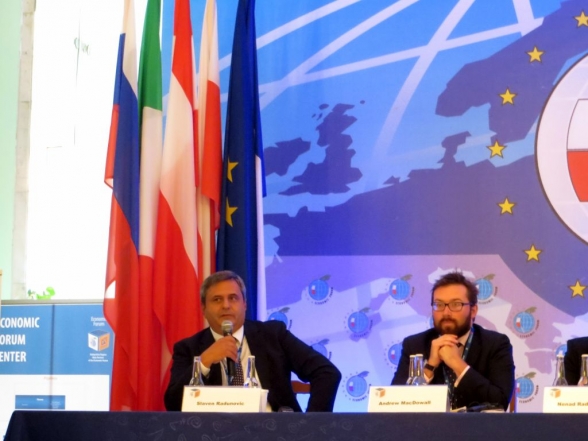On the last day of the Economic forum in the Polish city Krynica-Zdrój, within the thematic block “Europe and the World”, a panel discussion was held on the topic “European Perspective for the Balkans: Solid Policy for Stability and Prosperity”, with the following speakers: Mr Slaven Radunović, Chairperson of the Committee on European Integration of the Parliament of Montenegro, Mr Danilo Türk, Law Professor and former President of the Republic of Slovenia, Mr Mirza Ustamujić, Chairperson of the Executive Board of the America-Bosnia Foundation, and Mr Andrew MacDowall, Economic Correspondent and Analyst. The debate moderator was Mr Nenad Radičević, Germany Correspondent of Politika Daily.
Within his address, Mr Radunović presented the current stage of Montenegro’s negotiations with the European Union, pointing out that Montenegro, with 20 opened and two temporarily closed negotiation chapters, had achieved the greatest progress in this process. As the first country to open negotiations in compliance with the new system, which focuses on the rule of law, Montenegro is committed to providing support to its neighbours which are to go through this process as well, says Mr Radunović. He added that the country had significant challenges ahead relating to combating organised crime and corruption, where, in addition to administrative and technical capacities, political will was essential. Mr Radunović concluded with a position that the EU was anticipated to provide its wholehearted and sincere support, with clear indication of areas in which the country should provide additional efforts and perseverance in fulfilling the set goals, in the interest of all Montenegrin citizens.
Mr Danilo Türk pointed out the significance of mechanisms used to promote cooperation between the Western Balkans countries, the most prominent of which being the Berlin Process. With regard to future EU politics towards the Balkans, he said that the Balkans should be viewed as an intrinsic part of Europe. In that respect, the level of EU investments in the region should be increased, and the asylum requests coming from the Balkans should be responded to in an orderly manner - to create the environment for opening new jobs, thus decreasing the number of asylum seekers, but also to create long-term projections for employing persons from the region in the Union, in accordance with demand in the European labour market.
Mr Mirza Ustamujić presented the political and economic situation in Bosnia and Herzegovina, expressing hope in the young generations as generators of social change in the country. He added that the Western Balkans countries should work together on concrete projects, and in that respect he welcomed the results of the Western Balkans conference held in Vienna in August, where the conclusions were adopted on cooperation in the area of building infrastructure.
Mr Andrew MacDowall reminded that the new approach of the EU in negotiations with the Western Balkans countries, focusing on the rule of law, had been designed in compliance with the EU’s experiences in the previous waves of enlargement. He added that the regional actors, such as Slovenia and Croatia, should play an even stronger role in the Western Balkan countries in the EU accession process, bearing in mind their strong cultural and linguistic ties. Mr MacDowall reminded that cooperation was best promoted trough trade, and he invited the Western Balkan countries to work on promotion of mutual trade relations, but also relations with its closest European neighbours.
Within the debate, the participants were inquiring about the relations between the Western Balkans countries and Russia, Macedonia’s progress in the integration process, as well as the possibilities of strengthening the investment potential of the region.
The 25th Economic Forum has gathered more than 3000 participants from Europe, Asia, and the United States of America.









